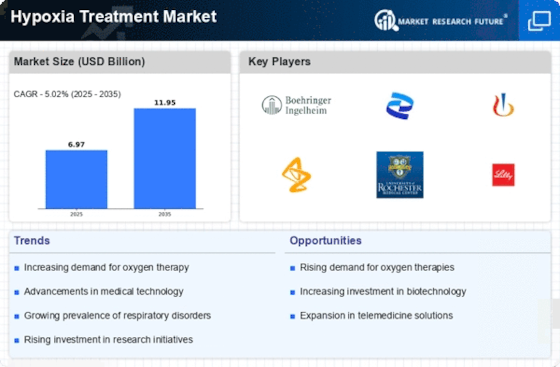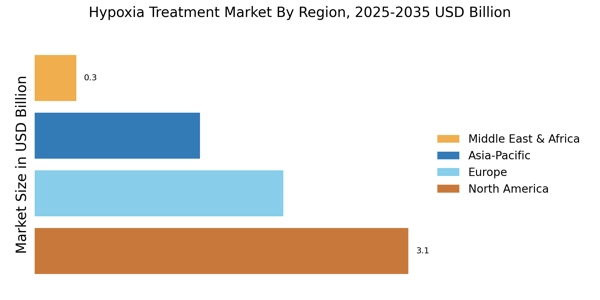Increase in Geriatric Population
The aging population is a significant driver of the Hypoxia Treatment Market. As individuals age, they are more susceptible to various health conditions, including those that lead to hypoxia. The World Health Organization projects that the number of people aged 60 years and older will double by 2050, which could result in a higher incidence of hypoxia-related disorders. This demographic shift necessitates the development of targeted treatments and management strategies for older adults. Healthcare systems are increasingly focusing on geriatric care, which includes addressing hypoxia as a critical component of overall health management. Consequently, the Hypoxia Treatment Market is expected to grow as healthcare providers seek to cater to the unique needs of this population.
Advancements in Medical Technology
Technological innovations in medical devices and treatment methodologies are propelling the Hypoxia Treatment Market forward. The development of advanced monitoring systems, such as pulse oximeters and portable oxygen concentrators, enhances the ability to diagnose and manage hypoxia effectively. Furthermore, the integration of telemedicine and digital health solutions allows for real-time monitoring of patients, improving treatment outcomes. The market for hypoxia treatments is projected to expand as these technologies become more accessible and affordable. In addition, research into novel pharmacological agents that target hypoxia-related pathways is gaining momentum, indicating a promising future for the Hypoxia Treatment Market. The convergence of technology and healthcare is likely to redefine treatment paradigms, making hypoxia management more efficient and patient-centered.
Rising Incidence of Respiratory Disorders
The increasing prevalence of respiratory disorders, such as chronic obstructive pulmonary disease (COPD) and asthma, is a notable driver for the Hypoxia Treatment Market. According to recent estimates, respiratory diseases affect millions of individuals worldwide, leading to a heightened demand for effective hypoxia treatments. This trend is further exacerbated by environmental factors, including air pollution and occupational hazards, which contribute to the deterioration of lung health. As healthcare systems strive to address these challenges, the Hypoxia Treatment Market is likely to witness significant growth. The need for innovative therapies and advanced medical devices to manage hypoxia in patients with respiratory conditions is becoming increasingly apparent, suggesting a robust market potential in the coming years.
Growing Awareness of Hypoxia and Its Effects
There is a notable increase in awareness regarding hypoxia and its detrimental effects on health, which is driving the Hypoxia Treatment Market. Educational initiatives by healthcare organizations and advocacy groups are informing both patients and healthcare providers about the risks associated with hypoxia. This heightened awareness is leading to earlier diagnosis and intervention, which is crucial for effective treatment. As a result, healthcare providers are more inclined to invest in hypoxia management solutions, thereby expanding the market. The emphasis on patient education and self-management strategies is also contributing to the growth of the Hypoxia Treatment Market. This trend suggests that as knowledge about hypoxia continues to spread, the demand for effective treatment options will likely increase.
Regulatory Support for Innovative Treatments
Regulatory bodies are increasingly supporting the development and approval of innovative treatments for hypoxia, which is positively impacting the Hypoxia Treatment Market. Initiatives aimed at expediting the approval process for new therapies and devices are encouraging pharmaceutical and biotechnology companies to invest in hypoxia-related research. This regulatory environment fosters innovation and enhances the availability of effective treatment options for patients suffering from hypoxia. Moreover, collaborations between regulatory agencies and industry stakeholders are likely to streamline the development of novel therapies, further propelling market growth. As the demand for effective hypoxia treatments continues to rise, the supportive regulatory landscape will play a crucial role in shaping the future of the Hypoxia Treatment Market.

















